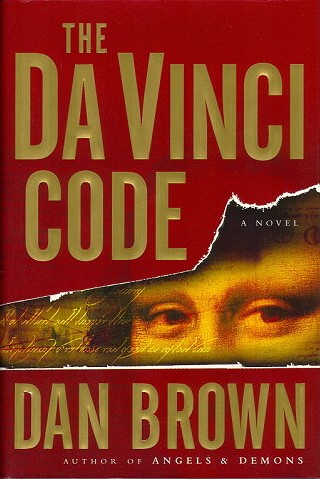So in The Writer’s World (imagine an alternate universe of eggheads, wannabes, dreamers, drinkers, and too-often-self-obsessed thinkers) Dan Brown’s blockbuster novel The Da Vinci Code (2003) has a reputation about on par with Ed Wood movies or, for a more literary comparison, that hugely popular The Bridges of Madison County (1992)—a stinker that made a ton of dough. But apparently Dan Brown has a new novel coming out, and the other day his publisher was offering a free ebook of TDVC . . . . And being the literary sleuth that I am (plus naturally curious) I decided to give it a go. Part of me wanted to find an answer for that basic question: Is it really as bad as they say? So I read it. And . . .
In a nutshell: Yes, and No. Is it “badly” written? Well, yes. Some of the sentences are true howlers. Brown has a knack for flat-footed prose, the inelegant sentence, the clumsy phrase, the awkward italicized thought (My God, this book couldn’t really be that bad, could it?!!), dialogue that only serves the function of explaining awkward plot twists, sloppy action description, and . . . the list goes on and on. Yet I still like the book. Which is interesting, isn’t it? It begs the question: Does a book have to be well written to be “good”? I’ll go out on a limb and say, I don’t think so. Are there books that are well written but “bad”? Yep. I’ve know some of those well.
What complicates The Da Vinci Code‘s case about being either a good/bad book (depends on the lighting, like certain dates) is that it is also a (rather awful) film, starring a good actor, Tom Hanks. I saw the film version first and thought it was laughably bad, muddled to the point of being absurdly nonsensical. The book does not have that flaw. In fact perhaps the book over-explains it’s “controversial” ideas. I grew up in a Catholic family, knew many priests (none of whom were pedophiles, by the way) who talked about doubt in an intelligent way, and so the notion of someone questioning the divinity of Christ seems rather run-of-the-mill. The novel actually does make that part of the plot interesting, and if not ground-shaking, at least fascinating from a historical viewpoint. All this leads me to lean toward the nuanced conclusion that a book can be badly written, and much fun. That would be my summary judgement on The Da Vinci Code. It’s like The Old Man and the Sea, only different. (p.s. I’m a huge Hemingway fan, and think him one of the great American writers, but TOMATS (fun to acronym that title) is a bit of a howler itself.

- October 2023
- September 2023
- September 2021
- April 2020
- September 2019
- May 2019
- August 2018
- February 2018
- January 2018
- October 2017
- August 2017
- June 2017
- May 2017
- March 2017
- February 2017
- November 2016
- October 2016
- May 2016
- April 2016
- March 2016
- February 2016
- January 2016
- November 2015
- October 2015
- September 2015
- June 2015
- May 2015
- April 2015
- March 2015
- December 2014
- September 2014
- August 2014
- May 2014
- March 2014
- February 2014
- January 2014
- December 2013
- November 2013
- October 2013
- September 2013
- August 2013
- July 2013
- June 2013
- May 2013
- April 2013
- March 2013
- February 2013
- January 2013
- December 2012
- November 2012
- October 2012
- September 2012
- August 2012
- July 2012
- June 2012
- May 2012
- April 2012
- March 2012
- February 2012
- January 2012
- December 2011
- November 2011
- October 2011
- September 2011
- August 2011
- July 2011
- June 2011
- May 2011
- April 2011
- March 2011
- February 2011
- January 2011
- December 2010
- November 2010
- October 2010
- September 2010
- August 2010
- July 2010
- June 2010
- May 2010
- April 2010
- March 2010
- February 2010
- January 2010
- December 2009
- November 2009
- October 2009
- September 2009
- August 2009
- July 2009
- June 2009
- May 2009
- April 2009
- March 2009
Recent Posts
- Aliens Among Us: Probing Hillbillies and Freaking Shut-ins, How Netflix’s “Encounters” and Hulu’s “No One Will Save You” Prep Us for the Coming Alien Apocalypse, Kind of
- My Life as a Bob Odenkirk Character: On How Watching Netflix’s Black Mirror episode “Joan Is Awful” Mimicked My Experience of Watching the AMC series Lucky Hank
- “Bobcats, Bobcats, Bobcats”: Animal Life and a Tribute to “Modern Family”
- “The North Water”: This Ain’t Your Daddy’s Moby Dick
- Day 25: On David Quammen's "Spillover": Terrific Book That Foretold Our Pandemic, Kind of
Recent Comments
No comments to show.
